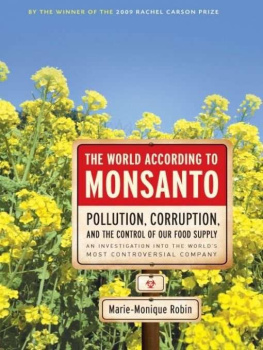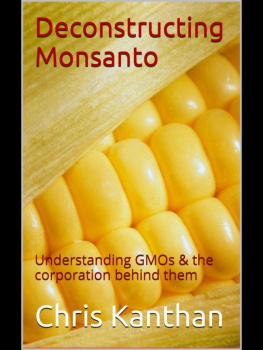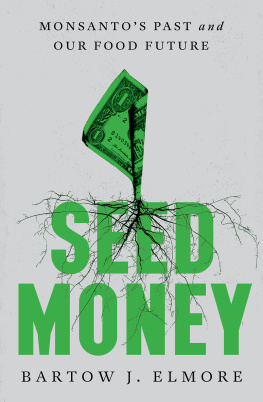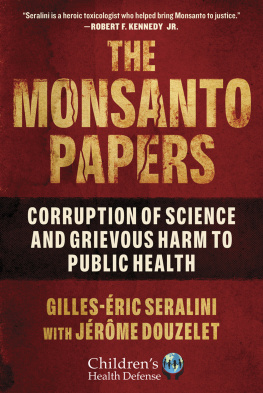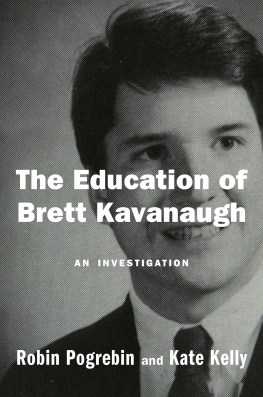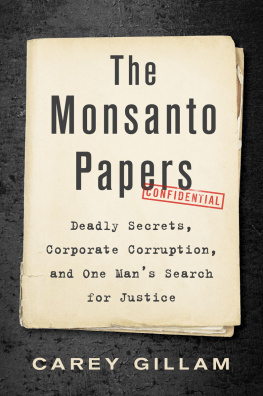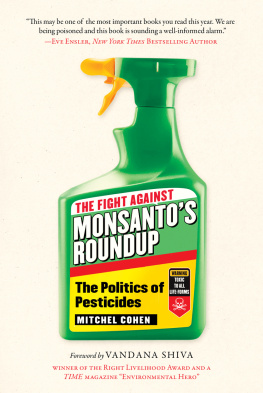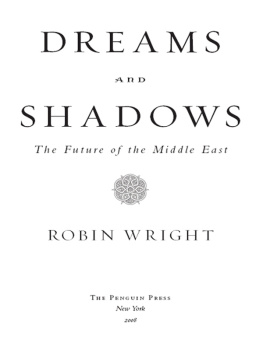Table of Contents
Also by Marie-Monique Robin
Voleurs dorganes: Enqute sur un trafic
Les Cent Photos du sicle
Le Sixime Sens: Science et paranormal (with Mario Varvoglis)
Escadrons de la mort, lcole franaise
Lcole du soupon: Les drives de la lutte contre la pdophilie
To my parents, Jol and Jeannette,
farmers who taught me to love the good things of the earth,
and so to love life.
Preface
A Book for Public Health
Nicolas Hulot
As I progressed in my reading of Marie-Monique Robins book, a flood of weighty questions overwhelmed me, filling me with anxiety that I might sum up in a single question: how is this possible? How can Monsanto, that emblematic firm of global agrochemistry, have made so many fatal mistakes, and how can it have marketed products so harmful to human health and to the environment? How has the company succeeded in conducting its business as though nothing had happened, constantly extending its influence (and its wealth), despite the tragedies its products have caused? How has it so quietly managed to continue its activities unconcerned and fool everyone? Why has it been able to carry on despite the heavy legal penalties it suffered and despite the bans imposed on some of its products (unfortunately, after they had already caused a good deal of irreparable harm)?
This book discloses a reality that hurts the eyes and grips the heart: that of a calmly arrogant company heedlessly profiting from the suffering of victims and the destruction of ecosystems. As the pages go by, the mystery is revealed. They show the prospering of a company whose history constitutes a paradigm of the aberrations in which industrial society has become mired. You may often shake your head in disbelief, but the demonstration is limpid, and we understand where Monsanto gets its power, how its lies have won out over the truth, and why many of its allegedly miraculous products in the end turned out to be nightmares. In other words, at a time when the North American company has taken on an even more totalizing ambition than beforeimposing genetically modified organisms (GMOs) on farmers and food consumers around the worldthis indispensable book raises the question, while there is still time, of whether it is necessary to allow a company such as Monsanto to hold the future of humanity in its test tubes and to impose a new world agricultural order.
Consider the facts. How did Monsanto become one of the major industrial empires on the planet? By accomplishing nothing less than the large-scale production of some of the most dangerous products of modern times: PCBs, which were used as coolants and lubricants, are devastatingly harmful to human health and the food chain and were banned after massive contamination was observed; dioxin, a few grams of which is enough to poison a large city and the manufacture of which was also banned, was developed from one of the companys herbicides, which was the basis for the grimly famous Agent Orange, the defoliant dropped on Vietnamese jungles and villages (which enabled Monsanto to secure the largest contract in its history from the Pentagon); bovine growth hormonesthe first test products for GMOsare intended to cause the animal to produce beyond its natural capacities regardless of the known consequences for human health; the weed killer Roundup used to be presented in endless advertising as biodegradable and favorable to the environment, a claim flatly contradicted by legal decisions in the United States and in Europe.
I have had serious doubts regarding certain practices of this company, particularly its use of police tactics against farmers. Marie-Monique Robins book not only confirms them but reveals both a company driven by the engine of business alone, which is hardly surprising, and, more troubling, a company whose actions are based on an extraordinary sense that it can do as it likes. She sketches a portrait of a firm that is expert at slipping through the cracks and persisting in its practices against all comers, no doubt convinced that it knows better than anyone else what is good for humanity, persuaded that it is accountable to no one, appropriating the planet as its playing field and profit center. In Monsantos position outside democratic control, it is hard to tell whether it is commercial blindness, scientific arrogance, or pure and simple cynicism that dominates.
Robins investigation is both dense and laser sharp; testimony is abundant and concordant, documents are revealed, and archives are deciphered. Her book is not a pamphlet filled with fantasy and gossip. It brings to light a terrifying reality. For, in the course of many years of marketing its productsPCBs, herbicides, dioxin, bovine growth hormones, RoundupMonsanto was fully aware of their harmfulness. The documents that the book reveals leave no doubt on that subject. Monsanto developed the habit of publicly asserting the opposite of what was known inside the company. Thanks to Robin, we now know what Monsanto knew. The company was aware of the toxic effects of its products. It persevered nonetheless, and it was allowed to go on.
Monsanto is now coming back in force and claims that the GMOs for which it is the principal seed producer have been developed out of its concern to help the farmers of the world to produce healthier food while at the same time reducing the impact of agriculture on the environment. The company claims that it has changed and that it has broken with its past as an irresponsible chemist. I dont have the scientific competence to assess the toxicity of certain molecules or the risks incurred by genetic manipulation. I only know that the scientific community is sharply divided about the effects of transgenesis and that the results of experiments with cultivated GMOs have not provided proof that they cause no harm to health or the environment or that they are able to intensify food production to conquer hunger. The balance sheet Robin draws up for Mexico, Argentina, Paraguay, the United States, Canada, and India is in any case distressing. I also know that the use of Monsanto 810 corn seeds, the only variety grown in France for commercial purposes, was wisely suspended by the French government in January 2008, after an administrative authority set up in the wake of the major environmental conference held in October 2007 pointed to new scientific findings and raised troubling questions. More generally, I know, as does any citizen on Earth with a grain of common sense, that one has to call a halt when it is obvious that industrial and commercial considerations have gone beyond the limits of the most basic precautions.
Today, while a real scientific, economic, and social debate is stirring France and Europe about the health and environmental effects of GMOs, as well as their consequences for the condition of farmers and the question of patents of living things, Marie-Monique Robins book is timely. It should be considered a work promoting public health and read with that in mind.
The global ecological crisis calls for a major transformation of the economic and social organization of human communities. It calls into question the capacity of world agriculture to provide sufficient food resources for the future nine billion inhabitants of the planet. There is no doubt that scientific and technological innovation can play a dynamic rolebut not in just any way and not in everyones hands.
Indeed, what exactly would the world according to Monsanto be like?
Introduction
The Monsanto Question
You ought to do an investigation of Monsanto. We all need to know what this American multinational really is, which is in the process of seizing control of seeds, and so of world food. The scene was the New Delhi airport in December 2004. I was being addressed by Yudhvir Singh, the spokesman of the Bharatiya Kisan Union, a peasant organization in northern India with twenty million members. I had just spent two weeks with him traveling around Punjab and Haryana, the two emblematic states of the green revolution, where almost all Indian wheat is produced.

